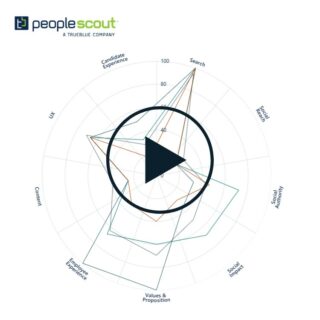While artificial intelligence (AI) has been a buzzword in recruitment for years, most organizations are only scratching the surface of its true transformative potential. The evolution of AI in talent acquisition from basic automation to genuine intelligence represents both a challenge and an unprecedented opportunity for forward-thinking talent leaders.
AI—particularly generative AI (Gen AI)—has disrupted recruitment as we knew it. In just a few short months, AI evolved from an abstract concept to a tangible force radically impacting businesses worldwide. According to the global Work Trend Index, produced by LinkedIn and Microsoft, 75% of global knowledge workers now use Gen AI, with adoption nearly doubling in just six months.
Yet despite this rapid adoption of AI in recruiting, there’s a significant gap between implementation and strategic integration. Only one in ten organizations has “broad leadership alignment, comprehensive tools and strong processes in place for Gen AI adoption.” This disconnect highlights a critical strategic challenge for talent acquisition leaders.
Moving Beyond Automation
While 63% of organizations now use some form of AI in their recruitment processes, most current implementations focus on basic automation—but this represents only a fraction of AI’s potential value. Traditional recruiting technologies, while effective at streamlining workflows, often fail to address the core challenges facing modern talent acquisition teams:
- Identifying true potential beyond traditional credentials
- Predicting candidate success and retention
- Scaling personalized candidate experiences
- Making confident decisions in dynamic labor markets
Preparing for the AI-Augmented Future
Organizations are entering a critical phase of AI integration that demands strategic preparation across multiple dimensions. The future of talent acquisition will be defined not just by technological capabilities, but by how effectively companies develop comprehensive AI strategies, establish ethical governance and manage organizational adoption.
Talent acquisition leaders must prepare for a future where AI not only transforms recruiter roles and reshapes workforce skills, but also demands a renewed commitment to maintaining human-centered, ethical hiring practices.
The Evolution of Recruiter Roles
AI is fundamentally reshaping the role of a recruiter into one of a strategic talent advisor. By automating administrative tasks, AI frees recruiters to focus on high-value activities like building relationships, understanding candidate motivations and serving as authentic employer brand ambassadors.
However, this transformation requires significant investment in upskilling. Talent acquisition leaders must invest in training their recruiters to work alongside AI, helping them develop new competencies in writing prompts and critical evaluation of AI-generated recommendations.
The AI-Augmented Workforce
It’s not only recruiters whose jobs are being transformed—the demand for AI-savvy talent is accelerating rapidly across all industries, and talent acquisition leaders must proactively prepare their organizations for significant changes in skill requirements and job roles. According to research from World Economic Forum, almost half (44%) of workers’ core skills will be disrupted by technology and the skills sought by employers in occupations with the most AI use are changing 25% faster than in other occupations.
This means developing strategies to identify and attract candidates with both technical competencies and adaptable mindsets who can thrive alongside AI systems. Organizations need robust upskilling programs to help existing employees transition into new AI-augmented roles, while simultaneously building hiring frameworks that evaluate candidates’ potential to learn and evolve with emerging technologies.
The Human Element & Ethical AI in Talent Acquisition
Despite the technological advances, the human element remains the cornerstone of successful talent acquisition. According to research from Workable, 15% of organizations rely exclusively on human judgment, while 57% use AI only as a supportive tool.
This balanced approach recognizes that AI excels at data processing, pattern recognition and routine task automation, while humans bring emotional intelligence, complex decision-making abilities and a nuanced understanding of context and culture.
As AI becomes more deeply embedded in recruitment processes, ethical considerations will be paramount. Organizations must commit to responsible AI usage by implementing rigorous auditing processes, ensuring fairness and maintaining transparency with candidates about AI’s role in the recruitment process. This human-centered approach is crucial for maintaining trust and mitigating potential biases that could emerge from automated systems.
👉 Learn more about implementing ethical AI practices.
AI in Talent Acquisition: Intelligence, Not Just Automation
The future of AI in talent acquisition lies not in basic automation but in truly intelligent systems that enhance human capabilities. Organizations must evolve to embrace AI capabilities that provide deeper insights and enable more informed decision-making.
This evolution requires significant investment in AI across the talent tech ecosystem while maintaining unwavering focus on the human element that makes recruitment successful. Those who adapt their strategies and technologies to this new paradigm will be better positioned to identify, attract, and retain top talent in an increasingly competitive landscape.
Ready to move beyond basic automation and transform your talent acquisition function with AI? Download our comprehensive ebook to discover how emerging AI technologies can give your organization a strategic competitive advantage in the battle for talent.



